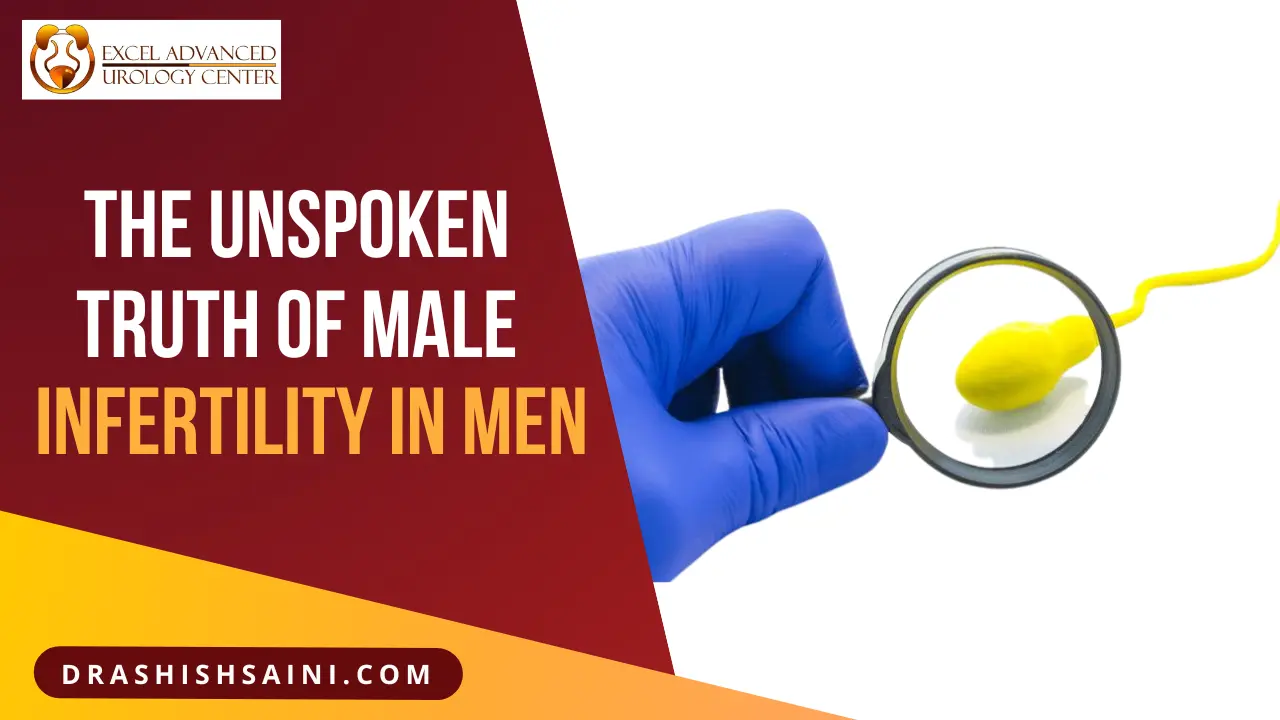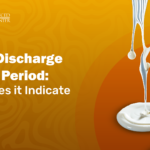

A disorder of the male or female reproductive system known as infertility is characterised by the inability to conceive after 12 months or more of frequent, unprotected sexual activity. Millions of males in the world who are of reproductive age struggle with male infertility problems, which also has an effect on their families and communities. Worldwide, it is estimated that 48 million couples and 186 million people struggle with infertility. But you don’t need to worry because, at Excel Advance urology center, Dr Ashish Saini provides the best male infertility treatment in Delhi NCR.
Male infertility is typically brought on by issues with the ejection of semen, a lack of sperm or low sperm counts, or irregular sperm shape (morphology) and motility (motion).
Male infertility is a prevalent issue. The process of conception is challenging and fraught with difficulties. Fortunately, having infertility in men problems does not preclude you from having a kid of your own with your partner. There are procedures and therapies that can raise the likelihood of conception.
What is Male Infertility?
A reproductive system issue known as infertility prevents you from becoming pregnant with a female. You, she, or both of you may have infertility concerns if a man and a female engage in recurrent unprotected sex for more than a year and the female doesn’t become pregnant.
How frequent is male infertility?
More than five million couples in the United States struggle with infertility, making it a widespread issue. One in every six couples who are attempting to get pregnant suffers from infertility. Male factors are a main or contributing cause of infertility in at least half of all cases. This indicates that approximately 10% of American men who are trying to get pregnant are infertile.
What causes male infertility?
A variety of biological and environmental factors may impact male infertility causes. Among the possibilities are:
- Azoospermia: Your failure to make sperm cells may be one of male infertility’s causes.
- Oligospermia: The generation of sperm of inferior quality.
- Klinefelter’s syndrome, myotonic dystrophy, microdeletion, and other genetic illnesses are a few examples of male infertility causes.
- Sperm isn’t healthy and won’t live long enough to fertilise the egg.
- Several medical problems, such as diabetes, a few autoimmune diseases, cystic fibrosis, and a few infections, are provided as examples of male infertility causes.
- Some drugs and supplements.
- Variococles: This is a disorder where your testicles’ veins are larger than usual. This causes them to overheat, which might alter the type or quantity of sperm you produce.
- Cancer therapies including chemotherapy, radiation therapy, or testicular removal surgery (one or both) could be the reason male infertility causes
- Substance abuse, including the use of alcohol, tobacco, and narcotics.
- A testicular trauma.
- Hormonal disorders: Issues with your hypothalamus or pituitary glands may have an impact on your ability to conceive and be a reason for male infertility causes

What are the symptoms of infertility in males?
The symptom is infertility itself. The detrimental psychological and emotional effects infertility has on a couple that desires to have children are considerably harder to put into words. Having a child often takes centre stage in people’s life. Both men and women who are trying to get pregnant frequently experience feelings of depression, loss, grief, inadequacy, and failure.
People or couples who are going through any of these emotions might wish to get support from medical professionals like a therapist or psychiatrist who has experience working with infertility problems. These professionals can support you as you receive male infertility treatment and assist you in dealing with the situation realistically.
Which men are more susceptible to male infertility?
- Male infertility can affect some men more than others. If you have excess weight or obesity, you might be more likely.
- 40 years of age or older.
- Radiation exposure has occurred to you.
- Environmental pollutants including lead, calcium, pesticides, or mercury have been exposed to you.
- You consume drinks, drugs, or cigarettes.
- You are currently using cyproterone, flutamide, spironolactone, bicalutamide, cimetidine, or ketoconazole, among other drugs.
- Your testicles are becoming hotter because of the heat in your environment. This might happen to those who routinely use wheelchairs, saunas, or hot tubs.
- You’ve previously had undescended testicles (s).
- You’ve previously had scrotal varicoceles, which are enlarged veins.
- You’ve come into contact with testosterone. Some men require topical gel, implants, or injections for low testosterone
How to increase male fertility: Consider sperm health improvement
Not usually are healthy sperm a given. Learn how your sperm might be impacted by your lifestyle and what you can do to increase male fertility.
How can one best create healthy sperm in order to increase male fertility?
Simple procedures to raise the likelihood of creating healthy sperm include:
- Keep a healthy weight. According to certain studies, sperm motility and count both decline when body mass index (BMI) rises.
- Adopt a balanced diet. Choose a variety of antioxidant-rich fruits and vegetables, which may assist to increase the health of your sperm.
- Avoid sexually transmitted diseases (STIs). Infertility in men as a result of STDs like chlamydia and gonorrhoea. A mutually monogamous relationship with a partner who isn’t infected, limiting the number of sexual partners, and always using a condom for intercourse can all help prevent STIs.
- Stress management. Stress can interfere with the hormones required to make sperm and impair sexual performance.
- Be active. Strong antioxidant enzyme levels can rise with moderate exercise, helping to protect sperm.
How are tests and diagnoses for male infertility performed?
A thorough physical examination is the first step in the diagnosis to ascertain your general health and spot any medical issues that may have an impact on your attempt to increase male fertility. Your healthcare professional may ask you and your partner questions about your sexual preferences. The next course of action may be to undergo testing to determine the cause of infertility if the physical examination and medical history fail to reveal any male infertility that causes your failure to conceive.
How is a male infertility test done?
Your doctor might perform a semen analysis initially. The following is determined:
- Sperm volume is the number of sperm in an ejaculate.
- An evaluation of acidity or basicity using pH.
- The number of sperm per millimetre of semen is known as sperm concentration.
- A number of sperm in your entire ejaculate, or total sperm count.
- Velocity: The sperm’s rate of movement.
- Linearity: The sperm’s movement’s straightness.
- Morphology: Your sperm’s size and form.
- Colour.
- Viscosity: The rate at which your semen dissolves.
- The viability, or capacity for survival, of your sperm, may then be examined in detail by your healthcare specialist.
- Morphology, or character and form.
- Your sperm’s motility allows it to go to the egg and fertilise it.
Other possible fertility tests for men include:
- Leukocytospermia quantitation/Endtz male fertility test.
- Kruger’s rigid classification of morphology male fertility test
- W.H.O. morphology for sperm evaluation.
- Azoospermic specimens require special staining for male fertility test
- The fructose test for semen is one of the fertility tests for men
- Antibody testing for sperm (direct and indirect immunobead) for male fertility test
- Species of reactive oxygen.
- Sperm DNA evaluation for male fertility test
About male infertility treatment
The velocity for male infertility treatment has increased because of contemporary technology and procedures. The following male infertility treatment may be used, depending on the cause of male infertility :
Male infertility treatment medications:
- Hormone therapy to boost sperm production.
- Maintain a healthy body weight by making lifestyle modifications.
- Give up smoking.
- Give up drinking.
- Abandon marijuana use.
- Stop using drugs recreationally.
Male Infertility Treatment surgeries:
- Vasectomy reversal: This frequent technique is performed as an outpatient operation. The vas deferens, the scrotal tube through which your sperm travels, is reconnected by the surgeon. The surgeon delicately stitches the ends of the vas deferens back together while using a high-powered surgical microscope to observe it.
- Vasoepididymostomy: This procedure clears obstructions in your vas deferens. The blockage is surgically removed, the ends of the tube are rejoined, and your vas deferens are separated. The epididymis, the coiled tube next to your testicle where sperm cells grow, may have developed another obstruction after the original vasectomy was carried out many years ago. Infection or damage to the epididymis can also cause blockage there. Whatever the source, your surgeon will resolve the issue by avoiding epididymis blockage.
- Sperm Recovery: In some serious cases, sperm recovery requires a testicular biopsy.
Other:
- Intracytoplasmic sperm injection: Through technological advancements, it is now possible to physically inject one sperm into an egg. Even the most severe cases of male factor infertility can now be treated thanks to a method called intracytoplasmic sperm injection (ICSI). 90% of all infertile men can now have their own genetic offspring thanks to this procedure.
- In vitro fertilisation: In vitro fertilisation (IVF) is the male infertility treatment of choice for certain couples struggling with male infertility. Injectable fertility drugs are used during IVF to stimulate the ovaries and encourage the maturation of many eggs. When the eggs are ready, a quick operation is performed to gather them. The process of fertilisation involves either directly inserting one sperm into each mature egg, known as intracytoplasmic sperm injection, or exposing the eggs to sperm in a culture dish (see above). Three to five days after fertilisation, the development of the embryo is checked, and two to three of the embryos are then implanted into the uterus using a tiny catheter that is introduced via the cervix.
Conclusion
Keep in mind that roughly 12% of all males who are trying to get pregnant experience infertility. In your struggle, you are not by yourself. 90% of all infertile men can now have their own genetic offspring thanks to modern technologies. You can adjust your lifestyle to prevent infertility, there are therapies for the reasons of infertility, and there are surgeries and procedures you can attempt to increase male fertility. Remember to consult a doctor if, after a year of unprotected sex, you and your spouse are still unable to conceive.
[elementor-template id=”1863″]
Dr Ashish Saini’s Clinic is at your service at all times
You can look for Dr Ashish Saini by entering “urologist near me” in the search bar. He is the top and best andrologist in Delhi and is regarded as the greatest urologist in Delhi NCR. Years of expertise have allowed him to observe how people are reluctant to discuss their sexual health. You can visit him for the male fertility test. For many people, it is not a top priority, but it is significant to remember that when you are content and healthy within, it shows on the exterior. His practice, Excel Advanced Urology Centre, specialises in helping people to increase male fertility and offers the highest calibre of care.
FAQ’s
1. What are the signs of infertility in males?
a. Issues with sexual function, such as problems ejaculating or ejaculating little amounts of fluid, decreased sexual desire, or issues keeping an erection (erectile dysfunction)b. Having discomfort, edoema, or a bump near the testiclesc. Respiratory diseases that recurd. Being unable to smelle. Abnormal breast development (gynecomastia)f. Hair loss on the face or body, or other chromosomal or hormonal anomalies
2. What is the most common cause of male infertility?
Male infertility is most frequently caused by issues producing healthy sperm. Sperm may be immature, have an unusual morphology, or be incapable of swimming. You could not have enough sperm in various situations.
3. How can a man become more fertile?
a. Keep a healthy weight. According to certain studies, sperm motility and count both declines when body mass index (BMI) rises which in turn helps one to increase male fertility.b. Adopt a balanced diet.c. Avoid sexually transmitted diseases (STIs).d. Stress management.e. Be active.
4. Which infertility treatment is best for me?
The most popular ART method in male infertility treatment is in vitro fertilisation (IVF). The process of in vitro fertilisation (IVF) entails activating and removing several mature eggs, fertilising them with sperm in a dish in a lab, and implanting the embryos in the uterus a few days later. You can contact Dr Ashish Saini for the best male infertility treatment.
5. Can chlamydia cause infertility in males?
Because CT is a major contributor to pelvic inflammation in the reproductive system organs, accounting for 40 to 80% of epididymitis and subsequently causing orchitis and prostatitis, male infertility is linked to it.








